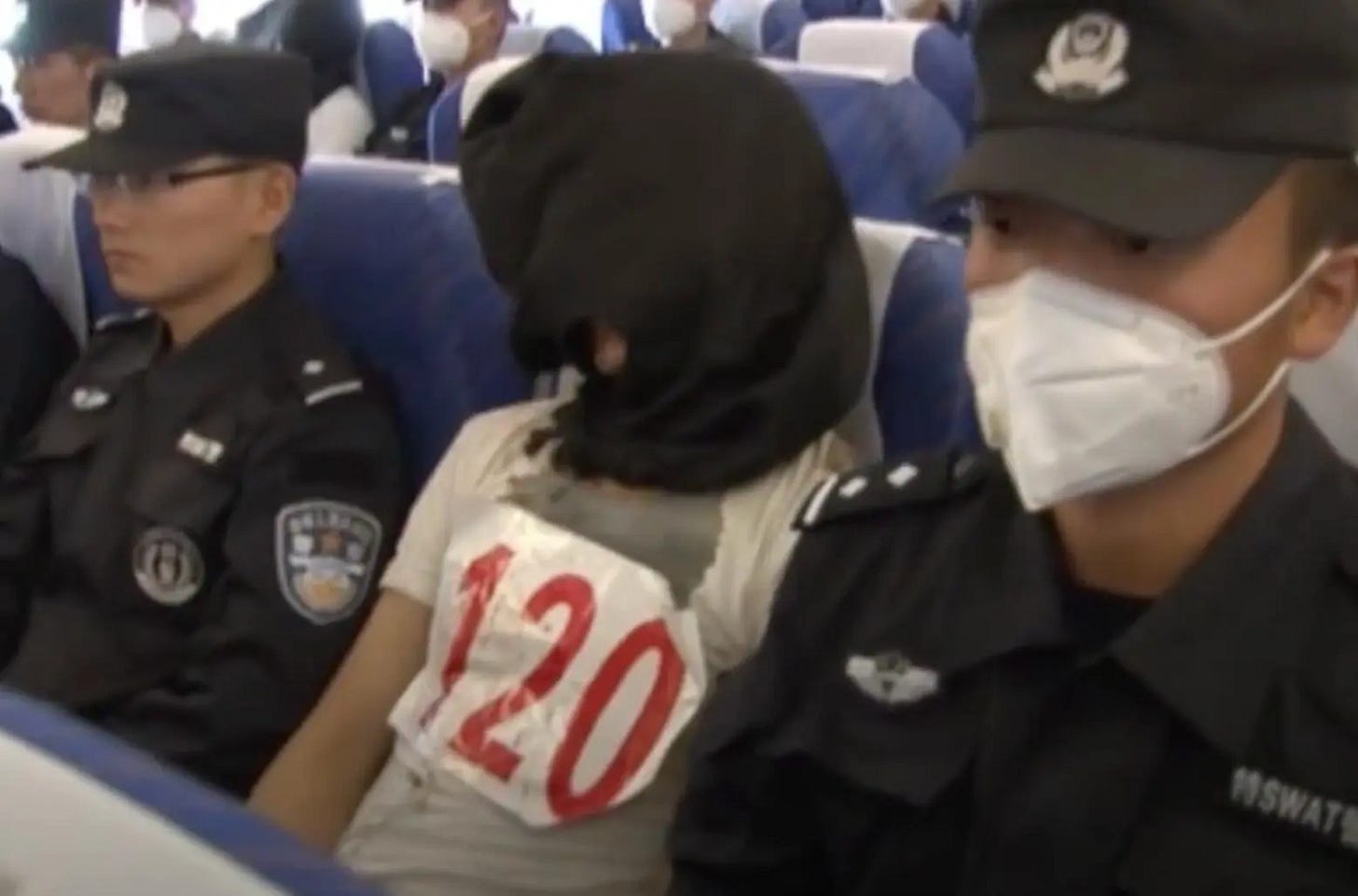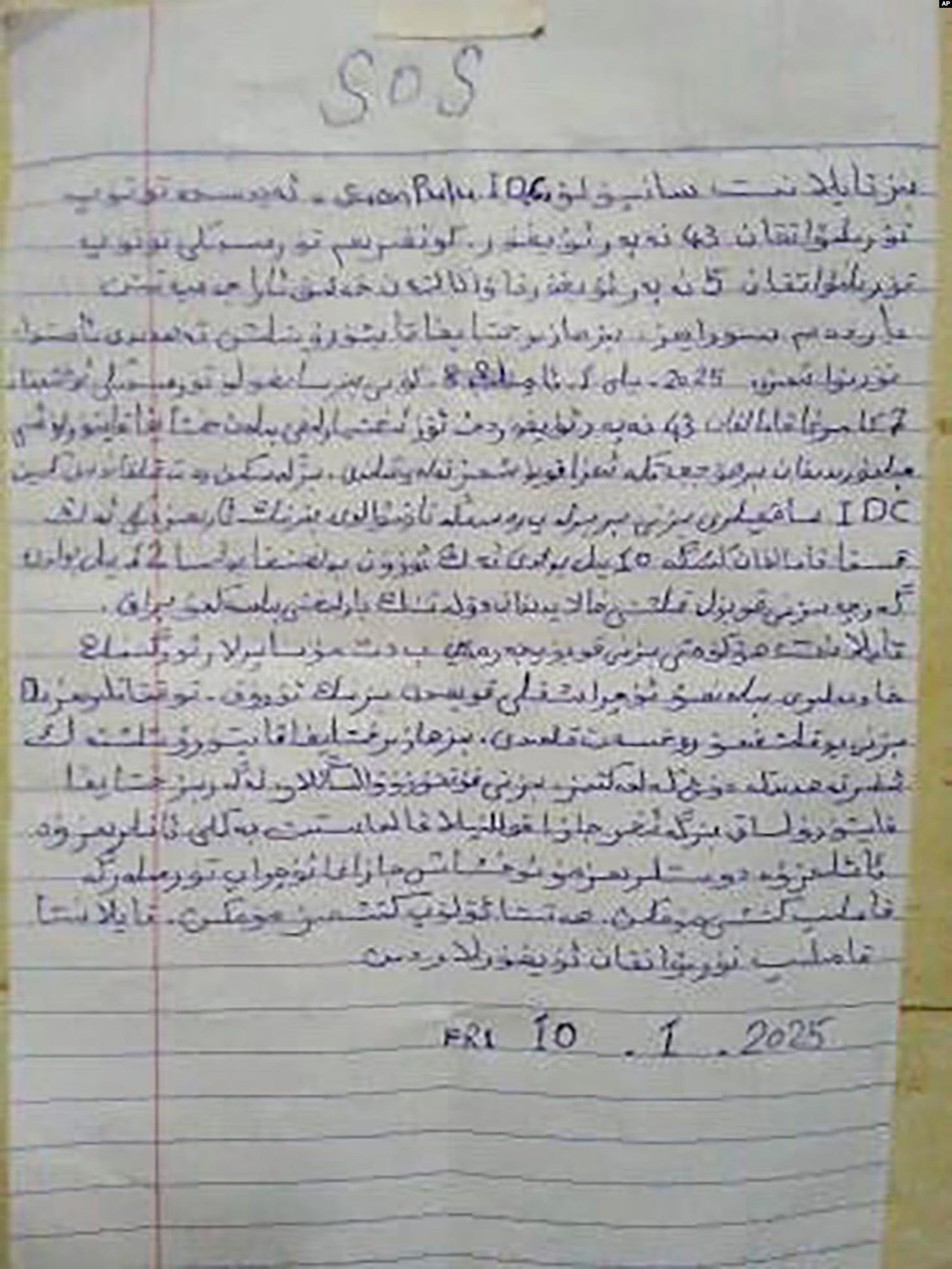Thailand is preparing to deport dozens of Uyghur asylum seekers
An urgent follow-up to "The Long Road from Xinjiang"

Thailand is preparing to deport to China more than 40 Uyghur asylum seekers who have been detained in the country for over a decade, a potential violation of international law that has led to desperate calls for UN intervention from human rights organizations and both Thai and U.S. lawmakers.
In November, Nyrola Elimä and I published a long investigation in The New York Times Magazine on the decade-long plight of Uyghurs who fled China before the rise of a mass internment campaign, and who have since been persecuted wherever they go. Among our sources were members of a group of 48 Uyghur asylum seekers who have been languishing in immigration detention in Thailand for more that 10 years.
As we wrote in our Times story:
In Thailand, even after five deaths in detention, the release of the surviving Uyghurs — 43 held in Suan Plu; five more serving sentences in a Bangkok prison for crimes related to a 2019 escape attempt — seems as distant as ever. Thailand’s ties to China have grown markedly in the decade that the Uyghurs have languished in detention. Since 2020, China has ranked as Thailand’s largest direct foreign investor. The two countries have also deepened their military ties with expanded joint training exercises and nearly a dozen major arms deals. According to multiple sources who have mediated with government officials on the Uyghurs’ behalf, Thailand is under substantial pressure from the Chinese government concerning all aspects of their treatment.
Our story, based in part on interviews with dozens of current detainees, family members, and survivors of Thai detention, highlights the dangers of deportation to China and the urgent need for other countries and human rights organizations to protect them from refoulement, a violation of international asylum law and multiple UN conventions.
Our story’s timing was unfortunately prescient. Early this year, after a decade of inaction, Thailand’s government began to signal they intend to deport the men to China — possibly in the coming days or weeks — according to multiple sources, including figures working closely with Thai officials and members of Thailand’s parliament.
Our investigation prompted calls for the Uyghurs’ release by 50 lawmakers from 26 parliaments worldwide, and led to significant coverage in other publications, including The Independent and The New Humanitarian, including follow-up coverage that highlighted the growing pressure on Thailand to submit to China’s regional authority.
The Associated Press now reports that the men are being prepared for deportation. Authorities have recently pressured them to submit to deportation proceedings:
Recordings and chat records obtained exclusively by the AP show that on Jan. 8, the Uyghur detainees were asked to sign voluntary deportation papers by Thai immigration officials.
On January 10, the 43 current detainees being held at an immigration detention center in Bangkok wrote an open letter pleading for help from the international community.
AP reporters Dake Kang and Huizhong Wu have also revealed that members of Thailand’s government are aware that high-level discussions are taking place to determine the Uyghurs’ fate. This accords with information Elimä and I have obtained in recent weeks.
Three people, including a Thai lawmaker and two others in touch with Thai authorities, told the AP there have been recent discussions within the government about deporting the Uyghurs to China, though the people had not yet seen or heard of any formal directive to do so. […]
Two of the people said that Thai officials pushing for the deportations are choosing to do so now because this year is the 50th anniversary of diplomatic relations between Thailand and China, and because of the perception that backlash from Washington will be muted as the U.S. prepares for a presidential transition in less than two weeks.
This has happened before. In 2015, Thailand deported more than 100 Uyghur asylum seekers to China, prompting international outrage that reportedly came as a surprise to Thai leaders. Our Times investigation describes the extent to which Thailand and China cooperated to send these Uyghurs back in spite of their asylum requests and the existence of other countries willing to serve as a safe haven — in violation of international law.
Documents we obtained from a public-security bureau in Xinjiang show that Thai authorities sent mug shots of 306 Uyghur adults and 71 children to authorities in China in efforts to identify them, and that Chinese authorities subsequently ordered police units to identify and collect blood samples from detainees’ relatives to compare with samples taken from those in Thailand. Even after Turkey’s resettlement offer was made public, Thai and Chinese representatives held secret meetings and reached a preliminary agreement “to repatriate 306 Uyghurs to China,” suggesting an even larger deportation was planned. These documents, which reveal the extent of the collaboration between Thai and Chinese authorities, are described here for the first time.
For a decade, the dozens of Uyghurs who remained in Thailand following the mass deportation languished in conditions so severe than five of them died; relatives and advocates claim they died of treatable illnesses and malnutrition. Most of the Uyghurs are not charged with any crime (five are charged with crimes related to an escape attempt) and China refuses to release any information that would justify their deportation. As our story details, several asylum seekers managed to escape their cells and eventually reach other countries, including Turkey, but at least 48 men remain in Thailand. Until now, Thailand’s leaders seemed content to hold the remaining Uyghurs indefinitely, in violation of international norms.
This week, however, the fate of the men became an international flash point. During his Senate confirmation hearing for secretary of state yesterday, Republican Senator Marco Rubio was asked about those Uyghurs facing imminent deportation. His response follows:
Representatives Tom Suozzi and Chris Smith have also called on Thailand to halt deportations and secure the Uyghurs’ release.
Because of China’s economic and political influence in countries like Thailand, Uyghur asylum seekers are often denied the rights afforded to other sensitive migrant groups. The sudden shift in 2025 comes amid escalating pressure and economic incentives. Thailand’s new prime minister, Paetongtarn Shinawatra, is reported to have close ties to China and is planning a visit to the country that observers fear could lead to a deportation agreement.
Our Times investigation also revealed, for the first time, the existence of other countries who are willing to accept the Uyghurs as asylum seekers. Their existence is described in a letter we obtained written by the chairwoman of the government-run National Human Rights Commission of Thailand and addressed to the country’s then-prime minister:
Dated April 2023, the letter confirms that Uyghurs are forbidden contact with relatives, lawyers or other advocates, and subject to a different standard of care than other detainees. The letter also revealed the existence of “countries that are ready to take these detainees to settle down” and urged the relevant agencies to find a pathway to the Uyghurs’ resettlement. Similar urgings followed in a letter sent to the Thai government in February of this year by eight U.N. officials.
We have since shared this document with reporters from AP who independently confirmed our reporting. The letter makes clear that a solution exists that would comply with international law and prevent these asylum seekers from deportation to China, where they would likely face severe persecution including arbitrary detention, as described in an open petition from academics and researchers.
Despite ongoing calls from advocates, including a 2024 letter signed by eight UN officials, pressure from other countries to find a solution for the Uyghurs in Thailand has dwindled in recent years, and may vanish under a Trump administration that has downplayed international human rights issues. Our story ends on a bitter note. “Ultimately,'“ we write, “only Thailand’s government has the power to end the Uyghurs’ detention.” In the absence of foreign pressure to counteract China’s, intervention seems unlikely:
With no access to the outside world, the Uyghurs at Suan Plu have resorted to smuggling messages to relatives and advocates. We communicated with several current detainees, one of whom said he had not seen sunlight in 10 years. He sent regular updates about worsening conditions in Suan Plu and described the 2023 deaths as a turning point in their desperation. “The two deaths could have been prevented if they had taken them to doctors,” he told us. “We begged them, but they just ignored it.” […] He told us he wanted the outside world to know he was still alive and desperate for help. “I don’t want to die here,” he said. “I don’t want to be buried in a grave that doesn’t have my name on it.”



